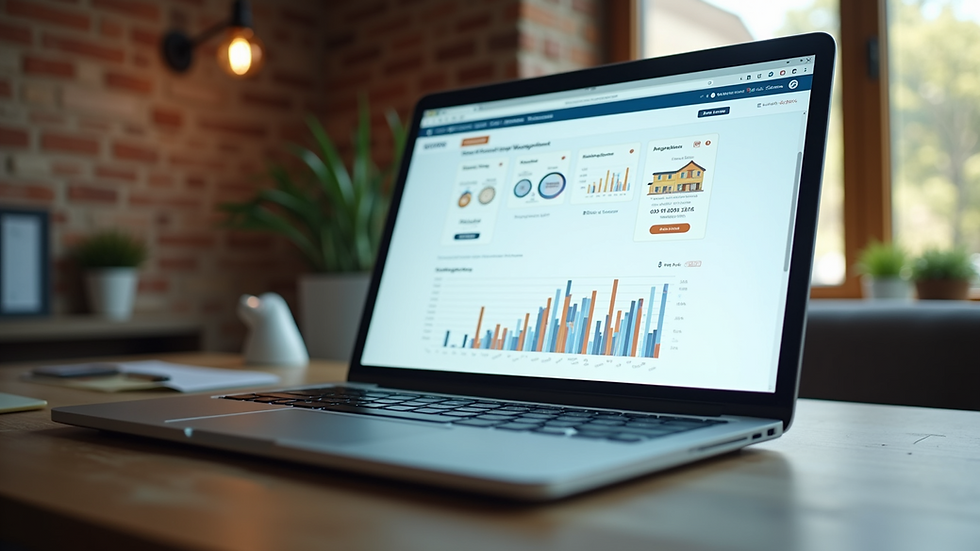How Property Management Software Pays for Itself
- domodomu
- Jun 13, 2025
- 4 min read
Managing a property, whether residential or commercial, can feel overwhelming. From handling tenant inquiries to maintaining records and ensuring timely rent collection, the responsibilities seem endless. For many property managers and landlords, finding an efficient way to streamline these tasks is crucial. This is where property management software comes in. Not only can this software simplify operations, but it can also pay for itself in various ways. Here, we will explore how investing in property management software can lead to substantial financial benefits.
1. Reduced Administrative Costs
One of the primary ways property management software pays for itself is through reduced administrative costs. Traditional property management often relies on manual processes, which are time-consuming and prone to errors.
By utilizing property management software, tasks like tenant screening, lease tracking, and payment processing can be automated. For example, automating tenant screening can save up to 75% of the time traditionally spent on background checks, allowing property managers to focus on other high-impact activities.
Lower administrative overhead directly translates to increased profitability for property owners. This added efficiency enables property managers to handle more properties without a proportional increase in costs.
2. Improved Rent Collection
Timely rent collection is essential for property owners. Manually tracking payments can lead to delays and mistakes. Property management software streamlines this process by offering various payment options for tenants, including online payments and automated reminders.
Studies show that properties using automated systems can see a 30% reduction in late payments. Furthermore, with easy access to payment histories, property managers can communicate more clearly with tenants about their payment status. Enhanced rent collection directly affects cash flow, vital for maintaining properties and funding new investments.
3. Enhanced Tenant Relationships
Good relationships with tenants significantly influence property management success. Many property management solutions include tenant portals where residents can easily submit maintenance requests, access documents, and communicate with management.
With a tenant satisfaction rate of over 80% reported by those using these portals, investing in tenant experience reduces turnover costs, including advertising and unit repairs. Satisfied tenants are less likely to move, leading to lower vacancy rates. This makes property management software not just a tool, but a strategic way to enhance tenant retention.
4. Efficient Maintenance Management
Proper maintenance of properties can be complicated and costly if not handled efficiently. Property management software often includes maintenance management features that automate logging and tracking repairs.
For instance, letting tenants report issues directly through a portal can reduce response times by 50%, allowing property managers to address small issues before they escalate into costly repairs. Proactive maintenance not only leads to longer lifespans for appliances but also saves property owners money in the long run. This software fosters both short-term savings and long-term value.
5. Data-Driven Decisions
Another vital aspect of property management software is the insights it provides. The software includes robust reporting tools that enable property managers to analyze key performance metrics such as occupancy rates and rental income.
By leveraging these analytics, managers can make informed decisions about pricing and marketing strategies. For example, properties that adjust rental rates based on market trends can improve occupancy by 15%. This data-driven approach supports better decision-making, ultimately enhancing profitability.
6. Streamlined Marketing Efforts
Attracting quality tenants is as important as managing properties. Many property management software solutions offer integrated marketing tools that publish listings across multiple platforms seamlessly.
With automation, property managers can decrease the time spent on tenant acquisition while increasing exposure. Properties that adopt these marketing strategies often see leasing times decrease by 25%, directly correlating to lower vacancy rates. Investing in property management software ensures more effective marketing efforts and better financial outcomes.
7. Cost-Effective Tenant Screening
Selecting quality tenants mitigates a host of potential problems, including late payments and property damage. Many software platforms include tenant screening packages that automate credit, criminal history, and rental experience checks.
Although this service has a cost, the potential savings on evictions and court fees can easily offset these expenses. Properties that conduct thorough tenant screenings report a 20% decrease in eviction rates. By choosing qualified tenants, property owners enhance property values and minimize turnover.
8. Scalable Growth
As a property management business expands, the ability to scale operations without significant overhead increases is vital. Property management software allows businesses to efficiently manage more units with the same administrative effort.
For instance, a software platform with multi-property capabilities can help property managers oversee up to 50% more units without needing additional staff. This scalability means property management software facilitates growth, profitability, and operational efficiency in a competitive market.
9. Long-Term Investment Returns
Although the initial investment in property management software may seem high, it is crucial to view it as a long-term investment. The accumulated savings in time, administrative costs, and maintenance can yield generous returns.
A well-chosen software platform promotes immediate operational improvements and supports long-term financial health. By investing in technology that facilitates growth and efficiency, property owners can ensure higher returns in the years to come.
Why Property Management Software is Essential
Property management software is not merely an expense; it is a valuable investment that pays for itself in numerous ways. From reducing administrative costs and improving rent collection to enhancing tenant relationships and streamlining maintenance, the benefits are clear.
Through data-driven decisions and effective tenant screening, property management software equips managers with the tools they need to optimize operations. The scalability and potential for long-term returns further underscore the importance of such software for growing property management businesses.
For property managers weighing the decision to invest in property management software, evaluating features and potential cost savings is crucial. The efficiencies gained can be significant. In today's competitive market, this investment can make all the difference in achieving financial success.





Comments